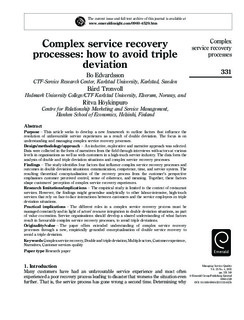Complex service recovery processes: how to avoid triple deviation
Journal article, Peer reviewed
Permanent lenke
http://hdl.handle.net/11250/134420Utgivelsesdato
2011Metadata
Vis full innførselSamlinger
Sammendrag
Purpose – This article seeks to develop a new framework to outline factors that influence the resolution of unfavourable service experiences as a result of double deviation. The focus is on understanding and managing complex service recovery processes.
Design/methodology/approach – An inductive, explorative and narrative approach was selected. Data were collected in the form of narratives from the field through interviews with actors at various levels in organisations as well as with customers in a high-touch service industry. The data form the analysis of double and triple deviation situations and complex service recovery processes.
Findings – The study identifies four factors that influence complex service recovery processes and outcomes in double deviation situations: communication, competence, time, and service system. The resulting theoretical conceptualisation of the recovery process from the customer’s perspective emphasises customer perceived control, sense of coherence, and meaning. Together, these factors shape customers’ perception of complex service recovery experiences.
Research limitations/implications – The empirical study is limited to the context of restaurant services. However, the findings might generalise analytically to other labour-intensive, high-touch services that rely on face-to-face interactions between customers and the service employees in triple deviation situations.
Practical implications – The different roles in a complex service recovery process must be
managed constantly and in light of actors’ resource integration in double deviation situations, as part of value co-creation. Service organisations should develop a shared understanding of what factors result in favourable complex service recovery processes, to avoid triple deviations.
Originality/value – The paper offers extended understanding of complex service recovery processes through a new, empirically grounded conceptualisation of double service recovery to avoid a triple deviation.
